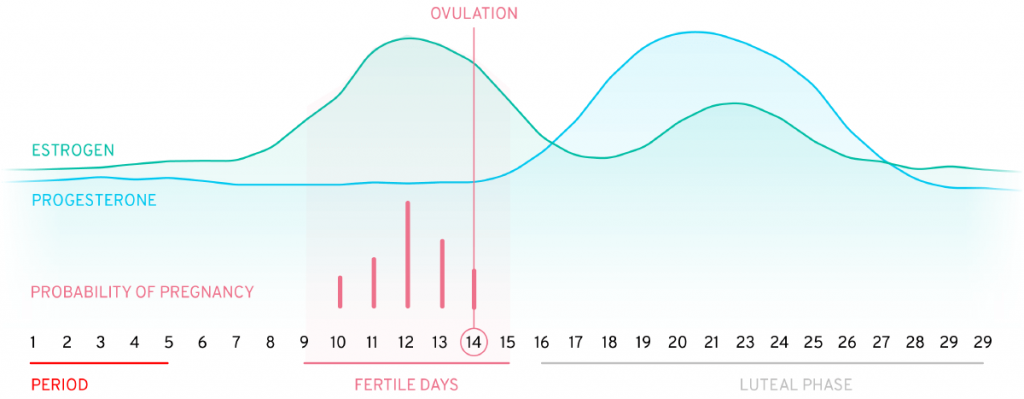Coming off HBC
An obvious but important first step is to discontinue any hormonal birth control (HBC). Even if you have been having regular periods while on HBC, your body will need to resume ovulation, which is typically suppressed while on HBC. For some the cycle can regulate very quickly, within a couple cycles. For others, this process can take several months, therefore it is important to plan ahead to stop using HBC well in advance of when you want to start the trying to conceive process. While you await your cycle to resume on its own after discontinuing HBC, focus on good health measures in the meantime!
What are the hormones that play a role in fertility?
When it comes to fertility, two main hormones take center stage: estrogen and progesterone. Estrogen is dominant as a woman’s body prepares for ovulation and enters the fertile window, as seen in this graph below:

This surge in estrogen triggers the cervix to secrete fertile cervical mucus that is vital for conception to occur. Women typically have the most fertile cervical fluid 2–3 days before ovulation. This is most often when a woman has the best chance of conception.
Fertility Tracking - Understanding your cycles & fertile window
For conception to occur you need a healthy egg, healthy sperm, and cervical mucus (sometimes referred to as cervical fluid). A woman has about 6 days during her cycle that are considered her fertile window, which includes about five days before ovulation through the day ovulation occurs. Since the egg can only survive for 12 to 24 hours after ovulation, it is ideal to have ¹ throughout a woman’s cycle and not all types signify that a woman is in her “fertile window.” The unique composition of fertile cervical mucus that best can sustain sperm is often compared to looking and feeling like egg whites (clear, and very stretchy) or watery mucus which feels very wet, sometimes causing a gushing or dripping sensation at the vaginal opening. Other types of cervical mucus such as sticky and creamy do not sustain sperm as well. By understanding your cervical mucus patterns, you can learn to predict when you are most fertile and when you are not, empowering you to make fertility decisions for yourself.
How can I track my cervical mucus easily?
There are many different methods for tracking cervical mucus. The Creighton Method, for example, teaches users to track the quality of the cervical mucus. The user must train in this method to confidently interpret their cervical mucus to know when they are potentially fertile.
kegg is a 2-in-1 fertility tracking device that predicts a woman’s fertile window by sensing the electrolytes in the cervical mucus that correlate to the hormonal fluctuations throughout her cycle. Since tracking cervical mucus can be challenging and require intensive training, kegg instead objectively tracks the electrolytes present in the cervical fluid to predict the fertile window in advance. In a sense, kegg “reads” the cervical mucus to determine the electrolyte composition and uses the trends of your cycle to make its educated predictions. In addition, unlike temperature tracking methods and LH testing, kegg predicts fertile days in advance, empowering women to identify when they are potentially fertile.
Confirming Ovulation
A common, non-invasive, way of confirming ovulation is by tracking your basal body temperature (BBT). There are several methods of temperature tracking, but in general, a temperature rise in the mid-cycle typically signifies ovulation has occurred. However, temperature readings are easily influenced by poor quality sleep, inconsistent schedules, sickness, and alcohol consumption making it challenging and sometimes less reliable. One of the easiest and most reliable ways to confirm healthy ovulation is with Proov. The Proov Progesterone Test Kit tracks PdG (Progesterone that has been metabolized in the liver and is excreted through urine) over a period of days to confirm healthy ovulation. It is a simple urine test, very similar to an at-home pregnancy test, that you perform with first morning urine days 7 to 10 after your fertile window to confirm that healthy ovulation has occurred. When kegg and Proov are used together, women are empowered with both the knowledge and foresight of when the fertile window will occur and the confirmation (or not!) that healthy ovulation has occurred to assist in trying to conceive.
Lifestyle adjustments to promote conception
When starting your trying to conceive journey, it is important to evaluate your lifestyle to ensure your habits and routine support healthy conception. The goal is to be your healthiest self so that you can have a healthy pregnancy and baby. Keep reading to learn steps you can take to help you reach your conception goals. We will go over some concrete things you can do to reach your conception goals!
Medication and supplements
Check with your doctor to make sure any current medications or supplements are safe to continue using while TTC and during pregnancy.
- Limit Caffeine (no more than 200 milligrams, equivalent to a 12oz cup of coffee. Don’t forget to count teas, energy drinks, and soda when limiting your caffeine)
- Quit using all tobacco products.
- Do not use recreational drugs.
- Avoid alcohol (especially binge drinking)
Keeping active
Living an active lifestyle and keeping a regular exercise routine can help balance your hormones and regulate your cycle. Keeping active can also improve your pregnancy and labor experience. A goal of 30 minutes of aerobic exercise is recommended, though, you should consult your doctor before initiating any exercise routine. Low impact exercises such as walking and yoga are also great options! When trying to conceive you and your partner may consider avoiding hot yoga, spas, and saunas which can interfere with conception.
Sleep
Though it may be challenging, getting plenty of rest and keeping a regular sleep schedule can be very beneficial to balancing hormones and aiding in regulating your cycle. It is ideal to try and get 8 hours of rest per night.
- Aim for a timeframe each night that you will be in bed by.
- Begin winding down at least an hour before bed.
- Avoid eating one hour before bed.
- Avoid screens and bright light before bed as these can interfere with the circadian rhythm and hormonal balance.
- Experiment with stress relieving methods and find what works for you.
Diet - Foods to love:
What we put in our bodies is vital to balancing hormones and supporting healthy cycles. Nourishing your body with nutrient-dense foods, like the ones below, can help improve conception odds and pregnancy.
- Iron-rich foods (meat, beans, lentils)
- 4 to 5 servings of vegetables a day with two of those servings coming from dark leafy green vegetables
- Lean proteins
- Yogurt
- 3 to 4 servings of fruits
- Whole grains
- Water (8-10 glasses a day)
Foods to avoid:
- Limit refined sugar and highly processed food
- Raw or undercooked eggs (such as in Caesar salads or poached eggs)
- Unpasteurized, raw milk products (including cheese)
- Deli meats
- Foods with nitrates (hot dogs, bacon)
- Seafood with high mercury content (which tend to be big fish like red snapper, tuna, swordfish)
- Raw seafood, smoked salmon
Vitamins:
It is very important to take a high-quality prenatal vitamin with no fillers and easily absorbed nutrients. Doing so can help optimize your chances of conceiving. Even if you eat a very clean and healthy diet, conception and pregnancy can be demanding on the body and it is extremely difficult to get all the nutrients you need from only food. In addition, if you are on a very restrictive diet because of personal beliefs or to manage a health condition, it is important to speak with your doctor about any supplementation that may be necessary to fill any nutritional gaps you may have.
Buying prenatal vitamins can be overwhelming because there are so many different brands, with different claims and different quantities of different vitamins. However, to make things a little easier, we suggest our personal favorite, Needed. Their products are inspired by nature, informed by science, and tailored to your needs. They have done the research to create formulations that optimally nourish you and baby before, during, and after pregnancy. They have worked meticulously to figure out exactly how much of which vitamins is best for you and baby and in which form it is most easily absorbed. An ideal prenatal supplement plan contains:
- 200mcg of Vitamin B12
- 40mg of Vitamin B6
- 500 mg of Vitamin C
- 400 mg of Choline
- 900 mcg of Folate
- 4,000IU per day of Vitamin D3
- 200mg of Magnesium
In addition, it can be valuable to take a high-quality Pre/Probiotic and Omega 3. Needed is able to help you with these supplements as well.
Trying to conceive can be stressful and sometimes discouraging. Our goal at kegg is to lessen the burden and to take the stress out of determining your fertile window so that you can have more confidence that you are trying to conceive at the right time. In addition to timing intercourse during your fertile window, ensuring that your habits support conception is one more step you can take to support yourself on your conception journey.
